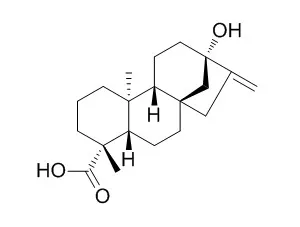| Description: |
Steviol, a natural sweetener, it inhibits proliferation of the gastrointestinal cancer cells intensively. Steviol can treat polycystic kidney disease, it slowed cyst growth, in part, by reducing AQP2 transcription, promoted proteasome, and lysosome-mediated AQP2 degradation. Steviol can induce a significant increase in CYP3A29 expression.
|
| In vitro: |
| Oncotarget. 2018 May 29;9(41):26299-26308. | | Steviol, a natural product inhibits proliferation of the gastrointestinal cancer cells intensively.[Pubmed: 29899860 ] |
New anticancer agents with lower toxicity have been always urged because of drug resistance associated with overused chemotherapy agents.
METHODS AND RESULTS:
In this study, Steviol, a colonic metabolite of natural sweetener and also a component in leaves of stevia rebaudiana bertoni, was found to possess intensive anticancer activity on the human gastrointestinal cancer cells. Steviol inhibited six human gastrointestinal cancer cells intensively as 5-fluorouracil did at 100 μg/mL. The inhibition mechanism follows mitochondrial apoptotic pathway that was evidenced by increase of Bax/Bcl-2 ratio, activation of p21 and p53; and caspase 3-independent mechanism was also involved.
These results are consistent with the miRNA expression analysis.
The most regulated miRNAs in the Steviol treated gastrointestinal cancer cells were miR-203a-3p (log2 =1.32) and miR-6088 (log2 =-2.54) in HCT-116, miR-1268b (log2 =19.85) and miR-23c (log2 =-2.05) in MKN-45.
CONCLUSIONS:
In view of the metabolic characteristics of Steviol and its cytotoxicity on the cancer cells, Steviol could be a chemotherapy agent potentially for cancer treatment. | | Food Chem. 2018 Aug 30;258:245-253. | | In vitro effects of rebaudioside A, stevioside and steviol on porcine cytochrome p450 expression and activity.[Pubmed: 29655729 ] | The physiological effects of the Stevia-derived compounds, rebaudioside A, stevioside and Steviol have been the focus of several studies due to their use as sweeteners in food. Despite that, little is known about their potential food-drug interactions.
METHODS AND RESULTS:
In the present study, IPEC-J2 cells and primary hepatocytes were used to investigate the effect of rebaudioside A, stevioside and Steviol on cytochrome p450 (CYP) mRNA expression. Moreover, hepatic microsomes were used to investigate direct interactions between the compounds and specific CYP activity. In IPEC-J2 no changes in mRNA expression of CYP1A1 or CYP3A29 were observed with the Stevia-derived compounds. In primary hepatocytes all three tested compounds induced a significant increase in CYP3A29 expression. The tested compounds had no direct effect on specific CYP activity.
CONCLUSIONS:
In conclusion, rebaudioside A, stevioside and Steviol induce only minor or no changes to the CYP expression and activity, and are not likely to cause food-drug interactions. | | Biomed Pharmacother. 2018 May;101:754-762. | | Steviol slows renal cyst growth by reducing AQP2 expression and promoting AQP2 degradation.[Pubmed: 29524884 ] | Overexpression of aquaporin 2 (AQP2) was observed and suggested to be involved in fluid secretion leading to cyst enlargement in polycystic kidney disease (PKD). The cyst expansion deteriorates the renal function and, therefore, therapies targeting cyst enlargement are of clinical interest. Of note, inhibition of vasopressin function using vasopressin 2 receptor (V2R) antagonist which decreased cAMP production along with AQP2 production and function can slow cyst growth in ADPKD. This finding supports the role of AQP2 in cyst enlargement. Steviol, a major metabolite of the sweetening compound stevioside, was reported to retard MDCK cyst growth and enlargement by inhibiting CFTR activity. Interestingly, its efficacy was found to be higher than that of CFTRinh-172. Since Steviol was also found to produce diuresis in rodent, it is likely that Steviol might have an additional effect in retarding cyst progression, such as inhibition of AQP2 expression and function.
METHODS AND RESULTS:
Here, we investigated the effect of Steviol on AQP2 function and on cyst growth using an in vitro cyst model (MDCK and Pkd1-/- cells). We found that Steviol could markedly inhibit cyst growth by reducing AQP2 expression in both Pkd1-/- and MDCK cells. Real-time PCR also revealed that Steviol decreased AQP2 mRNA expression level as well. Moreover, a proteasome inhibitor, MG-132, and the lysosomotropic agent, hydroxychloroquine (HCQ) were found to abolish the inhibitory effect of Steviol in Pkd1-/- cells. Increased lysosomal enzyme marker (LAMP2) expression following Steviol treatment clearly confirmed the involvement of lysosomes in Steviol action.
CONCLUSIONS:
In conclusion, our finding showed for the first time that Steviol slowed cyst growth, in part, by reducing AQP2 transcription, promoted proteasome, and lysosome-mediated AQP2 degradation. Due to its multiple actions, Steviol is a promising compound for further development in the treatment of PKD. |
|






 Cell. 2018 Jan 11;172(1-2):249-261.e12. doi: 10.1016/j.cell.2017.12.019.IF=36.216(2019)
Cell. 2018 Jan 11;172(1-2):249-261.e12. doi: 10.1016/j.cell.2017.12.019.IF=36.216(2019) Cell Metab. 2020 Mar 3;31(3):534-548.e5. doi: 10.1016/j.cmet.2020.01.002.IF=22.415(2019)
Cell Metab. 2020 Mar 3;31(3):534-548.e5. doi: 10.1016/j.cmet.2020.01.002.IF=22.415(2019) Mol Cell. 2017 Nov 16;68(4):673-685.e6. doi: 10.1016/j.molcel.2017.10.022.IF=14.548(2019)
Mol Cell. 2017 Nov 16;68(4):673-685.e6. doi: 10.1016/j.molcel.2017.10.022.IF=14.548(2019)